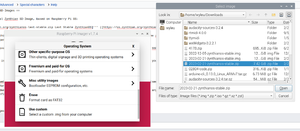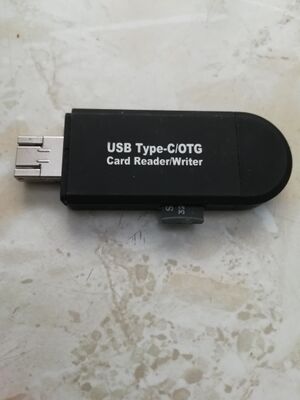Difference between revisions of "Zynthian Software"
| (47 intermediate revisions by 3 users not shown) | |||
| Line 1: | Line 1: | ||
| − | == | + | == Official ZynthianOS SD-Images == |
| − | + | This is the last official Zynthian SD-Image, based on Raspberry Pi OS: | |
| − | [https://os.zynthian.org/ | + | '''[https://os.zynthian.org/zynthianos-last-stable.zip Last Stable ZynthianOS]''' ([https://os.zynthian.org/zynthianos-last-stable.zip.md5 MD5-sum]) |
| − | + | == Unzipping == | |
| + | You will need to unzip this file to provide an .img file that can be 'burnt' to an SSD disk that is bootable in the zynthian machine. | ||
| + | This process differs depending on the Operating system you use for Internet access. | ||
| − | + | [[File:Imager.png|thumb]] | |
| + | A raspberry Pi desktop instance will unzip and burn the Imager application to write the SSD... | ||
| + | [[File:Usbssdwriter.jpg|thumb]] | ||
| + | You will require a SSD Writer, but this task can be completed with only the raspberry Pi you are using for the zynthian with a little ssd disk swapping. | ||
| + | <br> | ||
| − | + | == Instructions == | |
| − | ''' | + | {{NoteBox|This SD-image is pre-configured for '''official kits v4 & v3'''. If you are using a different hardware, your first step should be accessing the webconf and configuring your hardware. |
| − | |||
| − | |||
| − | |||
| − | + | * For accessing to the webconf tool, [[Accessing_Zynthian_from_your_computer#Accessing_the_Web_Configuration_Tool|see here]] | |
| − | + | * Once logged in go to Hardware -> Kit and select "Custom" then click on save button | |
| + | * Then, stil in the Hardware menu, configure each device: Audio, Display, Wiring (use "Dummies" if you do not use any encoder/switch). Don't forget to save your configuration after each step. | ||
| + | * When everything is configured, you can reboot Zynthian using the System -> Reboot menu item | ||
| + | }} | ||
| − | + | <!-- | |
| − | + | == Nightly Build SD-Images == | |
| − | + | If you like to be in the cutting edge, test the latest features and find the bugs, try the nightly builds: | |
| − | + | '''[https://os.zynthian.org ZynthianOS Nightly Builds]''' | |
| − | + | Our nightly build system is based on the fantastic work of @guysoft, the [https://github.com/guysoft/CustomPiOS CustomPiOS] system: | |
| − | + | ''CustomPiOS is a Raspberry Pi and other ARM devices distribution builder. CustomPiOS opens an already existing image, modifies it and repackages the image ready to ship.'' | |
| − | ''' | + | '''@guysoft has largely contributed to the project by configuring and setting up the ZynthianOS build server. Really big thanks!!''' |
| + | --> | ||
| − | == | + | == Preparing the SD-card == |
| − | + | Current images are 8 GB compressed image file compiled for Raspberry Pi 3. These SD card images include all the Zynthian software, properly configured for working with the official kits. Completely ready to use. Plug and play! | |
| − | + | After downloading the SD-image, you have to write it to a SD-card. You need a SD card with a '''minimum size of 16GB''', although you can use a bigger one if you want. | |
| − | + | Use [https://etcher.io/ Etcher] (free software works on Mac, Windows or Linux) to write the image onto the SDcard. Or do it manually! There is a really good manual for this at [https://www.raspberrypi.org/documentation/installation/installing-images/ this link]. | |
| − | + | {{NoteBox|RBPi2 is not currently supported by the latest official zynthian SD images, so if you want to use a RBPi2, you may need to build your own SD image.}} | |
| − | == | + | == Build your own image == |
| − | + | If you like, you can build your own SD image following these instructions: | |
| − | + | [https://discourse.zynthian.org/t/new-sd-image-setup-script/283 Building the SD Image using the Setup Script] | |
| − | + | Also, you would like to try the new docker-builder (thanks @guysoft!!): | |
| − | + | [https://discourse.zynthian.org/t/building-zynthian-image-now-works-with-docker/2499 Building Zynthian with Docker] | |
| − | |||
| − | |||
| − | |||
Revision as of 12:38, 18 March 2023
1 Official ZynthianOS SD-Images
This is the last official Zynthian SD-Image, based on Raspberry Pi OS:
Last Stable ZynthianOS (MD5-sum)
2 Unzipping
You will need to unzip this file to provide an .img file that can be 'burnt' to an SSD disk that is bootable in the zynthian machine. This process differs depending on the Operating system you use for Internet access.
A raspberry Pi desktop instance will unzip and burn the Imager application to write the SSD...
You will require a SSD Writer, but this task can be completed with only the raspberry Pi you are using for the zynthian with a little ssd disk swapping.
3 Instructions
Note:
This SD-image is pre-configured for official kits v4 & v3. If you are using a different hardware, your first step should be accessing the webconf and configuring your hardware.
- For accessing to the webconf tool, see here
- Once logged in go to Hardware -> Kit and select "Custom" then click on save button
- Then, stil in the Hardware menu, configure each device: Audio, Display, Wiring (use "Dummies" if you do not use any encoder/switch). Don't forget to save your configuration after each step.
- When everything is configured, you can reboot Zynthian using the System -> Reboot menu item
4 Preparing the SD-card
Current images are 8 GB compressed image file compiled for Raspberry Pi 3. These SD card images include all the Zynthian software, properly configured for working with the official kits. Completely ready to use. Plug and play!
After downloading the SD-image, you have to write it to a SD-card. You need a SD card with a minimum size of 16GB, although you can use a bigger one if you want.
Use Etcher (free software works on Mac, Windows or Linux) to write the image onto the SDcard. Or do it manually! There is a really good manual for this at this link.
Note:
RBPi2 is not currently supported by the latest official zynthian SD images, so if you want to use a RBPi2, you may need to build your own SD image.
5 Build your own image
If you like, you can build your own SD image following these instructions:
Building the SD Image using the Setup Script
Also, you would like to try the new docker-builder (thanks @guysoft!!):
Building Zynthian with Docker

